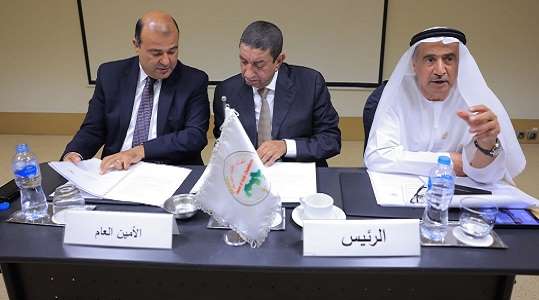The Standing Committee for Labor Affairs of the Union of Arab Chambers held its 39th consultative meeting on the eve of the 49th Arab Labor Conference in Cairo under the auspices of Egyptian President Abdel Fattah Al-Sisi. With the participation of the President of the Union of Arab Chambers, Chairman of the Bahrain Chamber of Commerce and Industry Samir Abdullah Nass, President of the Federation of Chambers of Commerce, Industry and Agriculture in Palestine, Abdo Idris, and Secretary General of the Union of Arab Chambers Dr. Khaled Hanafi. In addition to the participation of delegations from Jordan, the UAE, Qatar, the Sultanate of Oman, Bahrain, Saudi Arabia, Kuwait, Egypt, Lebanon, Tunisia, and Mauritania.
At the beginning of the meeting, Khalifa Matar Al-Kaabi was elected as Chairman of the Arab Group in the Arab Labor Organization, and Nasser Al-Meer as Vice-Chairman, after which the agenda items were discussed.
The meeting aimed to allow the chambers and federations of Arab chambers to discuss the matters on the agenda of the conference and any new matters.
The agenda of the meeting, according to the Secretary-General of the Union, Dr. Khaled Hanafi, included a number of items.
The Secretary General of the Union indicated that the first item dealt with the report of the Director General of the Arab Labor Office entitled: Social Dialogue between the Challenges of the Present and future prospects. The second item dealt with the decisions and recommendations of the Board of Directors, while the third item was entitled: Follow-up to the implementation of the decisions of the Arab Labor Conference. In the fourth item, legal and administrative issues were discussed. The fifth item was entitled: Implementing Arab labor conventions and Recommendations. The sixth item discussed the memorandum of the Director General of the Arab Labor Office on the 107th session of the International Labor Conference (Geneva, June 2018). The seventh item dealt with the formation of constitutional and statutory bodies in the Arab Labour Organization. The eighth item discussed the issue of issuing a normative tool on new patterns of work and amending Convention No. 9 of 1977 on vocational training and guidance. The ninth item dealt with TVET policies in light of digital transformation. The tenth item discussed the future of social security in the Arab region. The eleventh item was about determining the place and agenda of the 50th session of the Arab Labor Conference 2024.
The Secretary-General of the Union noted the importance of the solidarity of the Arab private sector in the face of pressures and transformations in the Arab region and the world in general, considering that the items on the agenda of the Arab Labor Conference simulate the economic and social reality in the Arab region and the world. Considering that, the Arab region is an integral part of the world, and there are many Arab countries that have made huge development leaps in recent years, but at the same time, there is a lot of work required at the level of joint Arab action to achieve sustainable development at the level of all Arab countries.
The participants' discussions focused on the importance of unifying the Arab position (governments and the private sector) in international forums, especially within the International Labor Organization, where there are hidden efforts to introduce norms and concepts that are incompatible with giving the rights of homosexual workers. This is in addition to the need to continue exerting pressure on the international community in order to protect the rights and interests of the Palestinian people, who are subjected to various types of oppression by the Israeli occupation.
The Director-General of the Arab Labor Organization, Fayez Al-Mutairi, attended the opening of the committee's work and gave a brief speech, in which he praised the role of the Arab private sector and its tremendous efforts in terms of economic advancement in Arab countries. Considering that the Arab private sector has always been a united bloc and will remain so, especially as it provides 75 percent of job opportunities in Arab countries and contributes 75 percent of the gross domestic product in the Arab region.
Source (Union of Arab Chambers)

